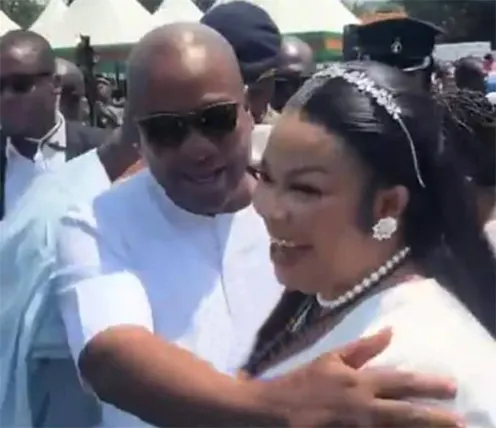The Embrace and the Afterglow: Nana Agradaa’s Encounter with President Mahama and the Subsequent Stir
Evangelist Patricia Asiedu, a prominent figure in Ghana known as Nana Agradaa, recently ignited a wave of public discussion following an encounter with former President John Dramani Mahama. The incident, which occurred at the maiden National Day of Prayer and Thanksgiving, involved a seemingly innocuous hug between Agradaa and the former president. However, Agradaa’s subsequent remarks, made in a lighthearted tone, amplified the event’s significance and sparked a flurry of interpretations and reactions.
Agradaa’s statement, "I’ve had the privilege to hug the president. Even if I don’t go to heaven, I’m okay," while seemingly casual, resonated deeply within the Ghanaian public sphere. This seemingly simple expression of joy and fulfillment, delivered with a touch of humor, quickly became a subject of widespread commentary, raising questions about the nature of faith, the influence of political figures, and the interplay between personal experience and public perception. The statement’s ambiguity, coupled with Agradaa’s known penchant for theatricality, left room for multiple interpretations, further fueling the public discourse.
The public response to Agradaa’s statement was varied and multifaceted. Some saw it as a harmless expression of excitement, understanding it within the context of a momentous personal experience. Others interpreted it as a reflection of the high esteem in which President Mahama is held by some segments of the Ghanaian population. For them, Agradaa’s words symbolized the profound impact that political leaders can have on individuals, even extending to matters of faith and personal fulfillment. Yet another interpretation focused on Agradaa’s own religious beliefs, suggesting that her words were indicative of a more complex and nuanced understanding of salvation and the afterlife.
However, a segment of the public viewed Agradaa’s statement with concern, interpreting it as a potential trivialization of religious beliefs. The idea that a physical interaction with a political figure could supersede the pursuit of spiritual salvation raised questions about the proper place of political figures within the realm of faith. This perspective highlighted the sensitivities surrounding religious beliefs and the potential for seemingly innocuous statements to be perceived as disrespectful or dismissive of deeply held values.
Agradaa’s background as a former traditional priestess turned evangelist added another layer of complexity to the public discourse. Her journey from traditional practices to Christian evangelism has been a subject of both fascination and skepticism within Ghanaian society. This transition has placed her in a unique position, navigating between two distinct belief systems and often attracting scrutiny from both sides. In this context, her statement about the hug and its perceived significance was viewed by some as reflective of her ongoing negotiation between these two worlds.
The incident also highlighted the increasing convergence of politics and religion in the Ghanaian public sphere. The National Day of Prayer and Thanksgiving, the setting for this encounter, is itself a manifestation of this intersection. Such events often become platforms for the display of political allegiances and affirmations, sometimes blurring the lines between religious devotion and political endorsement. Agradaa’s statement, with its reference to both a political figure and spiritual salvation, became emblematic of this complex interplay, prompting further discussion about the appropriate relationship between political leaders and religious faith.














